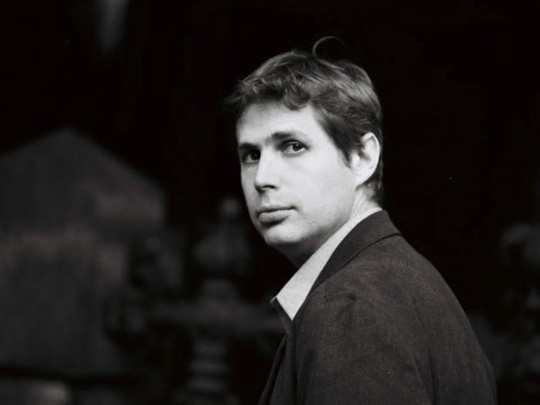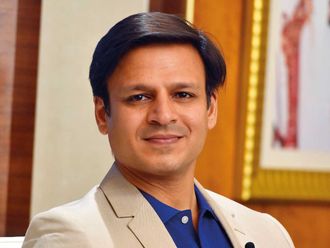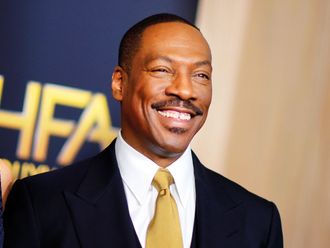
When Daniel Kehlmann was four years old, he went to watch his father, one of Germany’s most sought-after theatre directors, lead a rehearsal at Vienna’s Josefstadt theatre. A chandelier was lowered from the ceiling, then raised again until it disappeared through a hole in the roof.
“I didn’t know that this took place every night; I really thought it had happened for the first time and only for me. I was shocked and happy. No performance has measured up since that morning.”
Kehlmann doesn’t offer an explanation for the anecdote, but two interpretations suggest themselves: for him, art needs to feel a little bit like magic; and a moment in the spotlight can be very brief indeed. They lift you up, but they can pull you down at any moment.
Kehlmann told the story about the chandelier in a controversial speech at the Salzburg festival five years ago. His fourth novel, “Measuring the World”, had just become a bestseller, and he was German literature’s bright young thing. But instead of enjoying his new role, Kehlmann lambasted the “formulaic avant-gardism” of the contemporary German drama scene: its obsession with elevating the director’s interpretation over the author’s intention had ruined the career of his father, who died in 2005, and who believed that directors should remain servants to the text.
His father’s struggles, Kehlmann now says, sitting outside a café by the River Spree in central Berlin, taught him a lesson. “It’s very easy to fall out of fashion. So much of the culture industry is about vague agreements. I experienced that strongly as a child. It taught me a certain degree of caution and scepticism when it comes to success.”
Kehlmann is an intriguing phenomenon. Born in Munich and raised in Austria, he is a literary superstar in the German-speaking world, whose books and speeches not only command long reviews and responses in the high-brow sections of the newspapers, but also shift copies.
“Measuring the World” sold 3 million copies in Germany alone and roughly twice that worldwide, having been translated into more than 40 languages; a film version was released in 2012. Still only 39, he has published six novels and three collections of essays, as well as a couple of novellas, film scripts and plays. His novels are on the school syllabus in Germany.
Yet he also seems in a different orbit from the rest of the German literary scene. While he professes that the German language is “the source of life in all my books”, and remains quick to cite his debt to the works of Goethe, Schiller and Schopenhauer as well as lesser-known writers such as Leo Perutz and Heimito von Doderer, his contemporary points of reference lie elsewhere. His eyes light up when he talks about Latin American magical realism, Jonathan Franzen, Zadie Smith and David Foster Wallace.
Kehlmann’s novels pursue big philosophical ideas, which may strike readers as very Germanic: the main character of his debut novel “Mahler’s Time”, published when he was only 22, was a “12-year-old Platonist”; his follow up dealt with a scientist who believed he could slow down time; and his latest book looks at the radical edges of the theory of “philosophy of mind”. But his novels arrive at those ideas in a very un-German way.
“Measuring the World”, a fictionalised twin-biography of the 19th-century scientists Alexander von Humboldt and Carl Gauss, evokes the era of Weimar classicism, when men in frock coats and wigs used to debate in coffee houses. Some readers, he concedes, may have bought it because they were flattered to be reminded of Germany’s role in the Enlightenment’s avant garde.
In fact, he says, it was intended as the antithesis of that — “a comedy about German high culture, about the German cult of genius”.
“I have met people who didn’t want to read “Measuring the World” because they thought it was a serious, educated, self-important book about intellectual history. It has gained an aura that is the very opposite of what it really is, and I do regret that a bit. I also think it’s problematic that it is now on the school syllabus, because, in reality, it’s a parody about how we deal with educational values.”
Kehlmann’s new book, “F” , does with the conventions of the family saga what his world bestseller did to the historical novel. It starts with another magical chandelier moment: struggling author Arthur Friedland takes his three sons to see a hypnotist in a circus tent. Soon after, he leaves his young family behind to start a lucrative career as an author in the Paulo Coelho mould, peddling cod philosophy to the masses.
Twenty years later, the eldest son Martin is a Catholic priest even though he doesn’t believe in God and his half-brothers Eric and Iwan are conmen — one dealing in finance, the other in art. Whether the letter in the title stands for “family”, “fate” or “fraud” remains unclear.
“I wanted to write a novel about families for people who don’t like novels about families. Conventional family sagas bore me: you have to wade through pages and pages of family pre-history — uncles, aunts, grandparents — when you’re only really interested in the main hero. I wanted to parody that kind of information overkill.”
One of the chapters in “F” slides down the Friedland family tree at a breakneck pace: entire lifespans are dispatched in a single paragraph. Within five pages we’re in the age of Napoleon, another 10 pages on life is so monotonous that three generations in a row are summed up with exactly the same words: “He never left his manor. Sometimes people passed nearby, they came from other places and wanted to go elsewhere. He did not want that.”
Kehlmann laughs when reminded of that passage. “Personally, I thought that was one of the funniest things I’ve ever come up with” — though experience has taught him that readers rarely share the author’s taste in punchlines. Getting the section past his editors was a struggle, he says: most of them assumed they were dealing with a printing error that needed correcting.
A serious interest in the mechanics of good comedy is another aspect that puts Kehlmann slightly at odds with traditional literature in his native tongue. He admires Wodehouse (“a Shakespearean talent for language”) and remains a keen student of “The Simpsons” (“particularly seasons eight to 15”).
“There’s a scene in ‘The City of New York vs Homer Simpson’ in which Homer has this incredible thirst, but the street vendor sells only bottles of Mountain Dew and these disgusting-looking cans of crab juice. Homer looks at the crab juice, gags, and then says: ‘I’ll have the crab juice.’ There’s no pause after that, no break for us to laugh. So much of good comedy is all about pace: that’s what I learnt from The Simpsons.”
Most contemporary German fiction lives up to its own stereotype in that respect, he says: “It’s not that we don’t have good comic authors in German, but comic authors don’t tend to be included in the official canon. The greatest comic dramatist of the 19th century, Johann Nestroy, is really only known in Austria, and even fantastic comic writers such as Max Goldt and Sven Regener have a hard time being recognised as serious authors here.
“It means that a lot of writers are being taught not to develop their humorous side. Again and again I meet German authors who are really funny people, but then I look in their books and there’s none of that here, because they’ve been taught to hide it.”
Goethe, Kehlmann’s theory goes, may be one of the culprits, having dismissed humour as nothing more than a technique to disguise bad character. German high culture’s resentment of comedy runs deep. “Our literature was shaped in the parsonage: most of the great German writers of the 19th century were the children of protestant pastors. They produced literature that was mainly about exploring your inner conscience.
“That’s also why the novel was never able to fully flourish in the German language. We could do poetry, because poetry is the individual’s engagement with him or herself and with god. The novel is the exploration of society’s interdependencies. But Germans didn’t know what society was: they only knew villages and parsonages. Austria is different in that respect: it had a courtly society, and in courtly societies indirect speech, irony and humour are very important, you have to be able to entertain people.”
Like its two most obvious influences, Franzen’s “The Corrections” and Foster Wallace’s “Infinite Jest”, “F” isn’t a comedy in the traditional sense: it jumps between genres, toying with melodrama here, riffing on the gothic horror story there. The chapter that follows the unravelling of financial adviser Eric’s mind is reminiscent of Franz Kafka or Elias Canetti — both laugh-out-loud funny and so uncomfortable that one occasionally needs to put the book down to get a breather, a kind of comedy of paranoia. Delirious on antidepressants, Eric stumbles around his home only to discover a hidden cellar door, and at the bottom of the stairs, another flight of stairs ... A classic Austrian motif, surely, straight out of the imaginations of Freud or Michael Haneke? “Oh, that scene has nothing to do with psychoanalysis. I’m with Nabokov on this: symbols bleach the soul, they numb our capacity to enjoy the fun and enchantment of art. I’m a big fan of classic horror fiction: Algernon Blackwood, MR James , HP Lovecraft. And in Eric’s case, it’s like the old joke: paranoid people can have enemies too.”
Is “F”, a book about sons and fathers, not a book about his relationship to his own father? “I know books can end up meaning something different from what their authors intended, but I don’t think here that’s the case. Unlike the father in my novel, my father was always very much there for me.”
Becoming a father is a more life-changing experience than losing one, Kehlmann believes, whose first child was born in 2009. His three previous novels were all explorations of the nature of artistic genius, even if the very notion of genius was ridiculed along the way. “F”,in contrast, is largely about men with limited means: priest Martin used to take part in Rubik’s Cube tournaments, but lost his touch; brother Iwan is a talented artist, but he sells his paintings under someone else’s name; even their father Arthur returns to admit that swapping family life for literary success may not have been worth it. “The absoluteness of responsibility,” Kehlmann says, “that’s something you only understand when you become a father yourself, and I think that might have worked its way into this book. Believing in your own genius — sometimes that’s just an excuse.”
–Guardian News & Media Ltd








